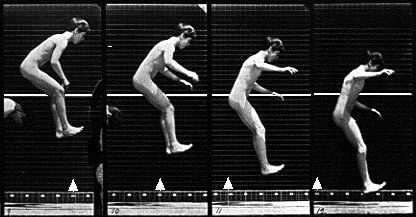
Fashioning the Body: Versions of the Citizen, the Self, and the Subject
The Evergreen State College | Fall 2007-Winter 2008
User Login |
Corpus - Metropolis
First of all, I want to say that my favorite part of Metropolis is the campy facial expressions and movements of the evil robot Maria. It is interesting to note how “good” and “evil” are portrayed through face and body. It was never difficult to tell which Maria we were seeing on screen because of body language. So, what bodily/facial actions are possible when one is evil as opposed to when one is good? (This makes me think of the Good Person. How would the actress who played Maria have acted the parts of Shen Teh and Shui Ta?)
It’s very interesting to think about the metonymy of heads and hands. Fredersen and those of his class are the heads – they work with their heads. Grot and the workers are the hands – they work with their hands. This suggests that Maria and Freder work with their hearts – interesting, then, that Maria works in child care. The final scene is very interesting because the joining of head and hand through heart all takes place by shaking hands. I think that, as a silent film, it wanted to show this reconciliation physically. And, apparently, the only way to show this was through hands. This suggests that only the hands, the workers, exist on a physical plane, as only the body part that stands in for them can be used to show the meeting of the hand and head on a physical plane. Fredersen, Rotwang, and other “heads” can’t show this about themselves physically, because this work takes place as disembodied spirits (to cite Mary Douglas). Is this, perhaps, why Rotwang has literally lost his hand? The difference between Tomorrow’s Eve and Metropolis are striking to me. Tomorrow’s Eve is not about class at all, while Metropolis is entirely about class (which is not to say that it doesn’t address other issues and contain other meanings, just that the main explicit meanings of the film revolve around class). In Tomorrow’s Eve, Ewald is fooled by Hadaly, but in Metropolis, Freder is not fooled by the robot Maria at all. And, of course, Maria is already perfect because her inside nature matches her beautiful outside appearance. The robot Maria is more like Alicia from Tomorrow’s Eve because her beauty is a façade. Rotwang originally was building the robot to replace Hel, who was dead. There wasn’t anything wrong with Hel – in fact she was perfect. In Metropolis, the robot is built to replace what is missing. In Tomorrow’s Eve, the robot is built to be just as good as a human woman because both are entirely artifice. I don’t have fully formed thoughts about technology in Metropolis, but I think the film’s attitude toward it is mixed. The evil instigator is a robot, and the machines are oppressive to the workers. But Grot says, “Who told you to attack the machines – without them you’ll all die!” And, of course, the answer to the question is that the robot told them to attack the machines. I know there’s a lot more to tease out here, but I need more time to think about it. The emphasis on children in Metropolis (Maria takes care of the children, she, Freder, and Josaphat save them from the flood, Fredersen worries about his son) reminds me of one of my thoughts about Tomorrow’s Eve that I forgot about before seminar – what about children? Why doesn’t it come up that Ewald can’t have children with the robot? Or did it come up and I missed it? It seems, particularly since there are issues of lineage with Ewald’s title and position, that this would come up somehow. Does the perfect woman not need to be able to procreate?
Submitted by Spencer on Sun, 11/11/2007 - 11:49am. Spencer's blog | login or register to post comments | printer friendly version
|
Who's onlineThere are currently 0 users and 1 guest online.
Events
|
|||||||||||||||||||||||||||||||||||||||||||||||||